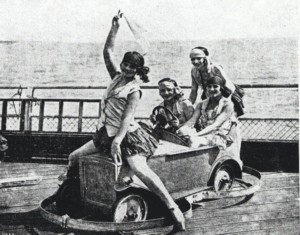UCSB
Hist 2c, L 19: Practicing History / The Cold War
by Prof. H. Marcuse, 6/3/03
- Draft + final version of paper due now.
- Course evaluations; letters for Nina Morecki?
- Study guide tonight & Thu; textbook chapter 56
choice: 2 hours & 2 essays, OR 3 hours & 2 of 4 essays
- Sandra: The Accidental Historian: Images and Other
Stuff
- Carolyn: Waking Sleeping Beauty: Sex and the Cold War
- Prof. Marcuse: The Cold War ends by Re"f"olution
Sneak Preview
Post-midterm essay question:
2. Some historians have argued that "great men make
history." Others argue that history is really the story of common people,
including especially women, since their status is often a more accurate measure
of the nature of a society. Using at least five examples from at least four
regions of the globe since the 1880s, argue why (or why not) the history of
women and gender relations is relevant to the course of world history. Feel
free to consider broader issues such as what our textbook calls the "population
bomb."
 The
Accidental Historian: Images and Other Stuff
The
Accidental Historian: Images and Other Stuff
by Sandra Dawson
Is this history?
Waking Sleeping Beauty: Sex
and the Cold War
by Carolyn Lewis
What were physicians saying about female sexuality?
- "The awakening of the vagina to full sexual functioning
is entirely dependent upon the man’s activity; and this absence of spontaneous
vaginal activity constitutes the physiologic background of feminine passivity."
--Psychoanalyst Helen Deutsch, quoted in JAMA, 1951
- "[L]ike the Sleeping Beauty, pierced in the hand – the
hand of guilty masturbation…the little girl will sink into slumber until such
time as the husband’s advent through the briars of the hymeneal forest awakes
her from sleep. Such would be the ideal development of our little girls."
-- Marie Bonaparte, Female Sexuality, 1953
- "From the beginning of history, woman’s destiny centered around her
role of motherhood. Her success as a wife lies in childbearing and childcare.
Her Godgiven rewards are happiness and fulfillment. Negation of these roles
creates severe anxiety reactions, emotional imbalance, and frustration. Her
personality dissolves into the abyss of depression and conflict. Life becomes
a hell, with no motivation and no future."
-- Gabriel Greco, MD in JAMA, 1966
What role does the physician play in all this? The Premarital
Pelvic Exam
- "The first procedure that helps the bride understand
and cooperate is teaching her how to relax and contract the vaginal sphincter
and pubococcygeous muscles. Even the fearful virgin…soon learns how to cooperate
and develop a more spontaneous rhythm….The second procedure consists in helping
her insert a well-lubricated Pyrex centrifuge tube. This helps the virgin
realize that there is a normal opening in the hymen….She is then asked to
bear down as she inserts the tube [further into the vagina]. The rate at which
she introduces the tube and her facial expression reveal her anxiety. The
return of color to her face and her relief, as she discovers no bleeding and
no pain, convinces the physician of the therapeutic value of this simply procedure.
The bride learns more about her ‘mysterious’ sex organs in these few minutes
than she could have learned in hours of talking and studying."
--Nadina Kavinoky, MD, in JAMA 1954
What does this have to do with the Cold War? Domestic
Containment
- "I consider your report on sexual behavior in the human female the
most direct and devastating attack upon Christian civilization made during
the present century with the single exception of the Lenin Revolution in Russia
in 1917, of which it is a tremendously effective corollary."
-- John Chapple, editor of the Ashland, Wisconsin Daily Press,
to Alfred Kinsey, 1953
- "That basic unit without which few societies can survive – the family
– depends upon discipline and control of sexual behavior. Without such control,
the family soon breaks down, and soon thereafter the whole society comes crashing
down – like the mighty Roman Empire, which is no more." --
William F. Sheeley, MD in JAMA, 1966
The Cold War
What was it?
- "… the open yet restricted rivalry that developed after World War II between
the United States and the Soviet Union and their respective allies. The Cold
War was waged on political, economic, and propaganda fronts and had only limited
recourse to weapons."
- Term first used by presidential advisor, financier Bernard Baruch, in 1947.
When did it begin?
- after World War II
- after World War I
- Western support of the counterrev. 'Whites"
- Soviet Union and Germany in the 1920s
- Hitler's anticommunism, 1930s
- Hitler-Stalin pact, August 1939
- Germany's invasion of the Soviet Union, June '41
When did it end?
- Stalinism and rigidity (hard-line)
1948 Czechoslovakia
1956 Hungary
1961 Berlin/East Germany
1968 Prague
1980 Poland
- 1986 Gorbachev's reforms
Perestroika
Glasnost
lecture by H. Marcuse on 6/3/03;
outline prepared for web on 6/3/03.
back to top, to Hist 2c
homepage
 The
Accidental Historian: Images and Other Stuff
The
Accidental Historian: Images and Other Stuff